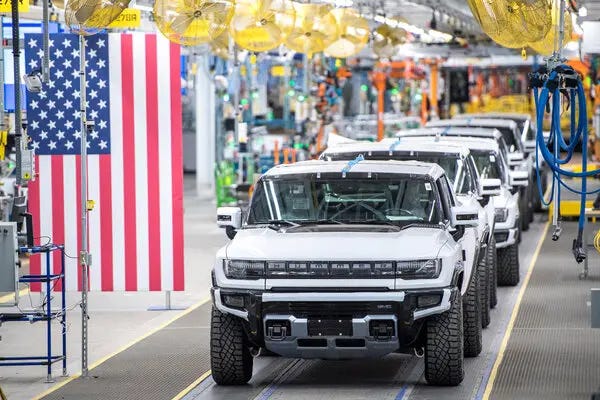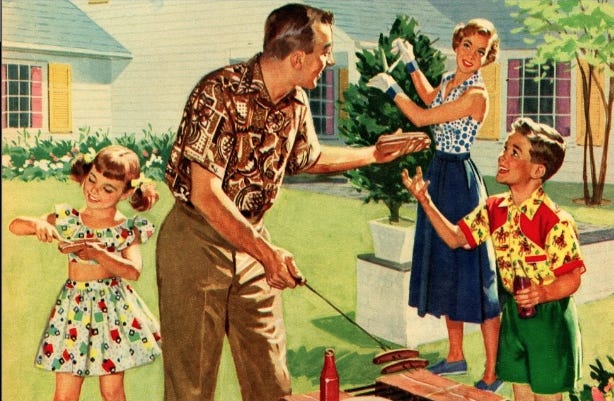Capitalist Societies Are Never Fully Capitalist, As Capitalism Requires the State to Survive.
Despite what some claim, Capitalism is not natural. As humans created it, we are more than capable of replacing it.
Welcome to JoeWrote, a publication where I explain the limitations of our Capitalist society and explore realistic solutions from the world of Socialism. Subscribe for free to ensure every article is delivered straight to your inbox.
You can help JoeWrote grow by sharing this article on social media or forwarding it to a friend.
Enjoy! In Solidarity — Joe
Proponents of Capitalism often claim that it is the most “natural” economic system, destined to bring prosperity to all as long as it is left unconstrained. They believe that the for-profit system of markets, the private ownership of the means of production (companies), and wage labor afford humanity the best opportunity to reach utopia. According to them, it is only when the dreaded government intrudes to impose “unnatural” factors, such as minimum wages and taxes, does the system falter. With this worldview as their guide, Capitalist ideologues argue against any form of government involvement in the economy, whether it be as simple as outlawing child labor or as grand as instituting Medicare-For-All. But despite these claims, the idea that Capitalism can exist without involvement from the state is provably untrue. And, by examining the ways in which Capitalism not only uses but requires the government’s involvement, we can see that the desire for the government to “get out of the economy” is solely an attempt to ensure the state continues to protect Capitalist wealth and not the interests of the working class.
In order for a profit-driven economic system to work, it must be supported by components of society that have no interest in profit. Capitalism, the highest form of a for-profit economy, is no different. Specifically, it requires three distinct types of support from non-profit-seeking institutions. They are:
1. State Salvation
2. State Enablement
3. The Role of the Family
Remove any of these three, and the American style of Capitalism would begin to falter, leading to its inevitable collapse
State Salvation
The most drastic support for-profit businesses receive from non-profit institutions comes in the form of government bailouts. The most famous case of state salvation, the New Deal, created many protections for American workers, but its primary purpose was to save Capitalism by staving off growing revolutionary thought.
“It was this Administration which saved the system of private profit and free enterprise after it had been dragged to the brink of ruin.” - President Franklin D. Roosevelt, 1933
More recently, the bailouts of 2001 and 2020 gave the airline industry over $70 billion in taxpayer money, propping up private companies that have been shown to be extremely susceptible to failure. Perhaps the most infamous bailout in recent memory came via the Obama Administration’s Troubled Assets Relief Program (TARP), which used taxpayer funds to temporarily buy stock in failing auto manufacturers, only to later sell it back to the Capitalist owners for a net loss. (You can read all about the impacts of auto bailouts in the piece below.)
Booms and busts are integral to the process of Capitalism. For every high-growth period, a recession is sure to follow. And yet, sometimes the busts are so deep that they threaten to be Capitalism’s undoing, as it is no longer able to provide the working class with the basic necessities. By relying on the state to bail it out when times are tough, Capitalism is able to ensure that its natural lifecycle doesn’t result in a bust so large it cannot recover.
State Enablement
But even when the state is not saving Capitalism with bailouts or New Deal-style reforms, the state provides for-profit owners with the infrastructure they need to conduct business. Amazon ships goods on public roads, public schools teach the working class how to read and write so they may become useful employees, and firefighters ensure storefronts aren’t lost to out-of-control blazes.
But far more important to enabling the creation of profit than the building of roads and schools is how the state serves as the scaffolding upon which Capitalism is built. In order for a for-profit company to conduct business, it must enter into contracts. These contracts can be grand, such as Shell buying the rights to drill for oil on someone’s land, or they can be minuscule, such as the contract you enter into when you purchase a candy bar from the gas station. Even in such a routine purchase, you are entering into a brief but binding contract to exchange money for goods. These contracts are not enforced by a for-profit entity, but by the state. If you didn’t pay for your candy bar, you would be charged with theft and imprisoned. And if a land owner tried to kick Shell off the land before the contract was up, the oil company would sue them in a U.S. court. Without a government to back up the enforcement of contracts, Capitalism could not exist. You could literally walk into a gas station, take whatever you wanted, and there would be no punishment. Or, if the landowner threatened to shoot any oil employee who set foot on his land, even though an agreement had been signed, Shell would be forced to dodge gunfire in the course of its daily operations.
It is through the state’s enforcement of contracts, and the underlying threat of punishment for violating them, that Capitalism is able to function. Without the state, there would be no means to conduct business. Profit could not be made, and Capitalism would crumble.
The Role of the Family
In addition to the above ways in which Capitalism could not exist without the state, the for-profit economic model depends on a unit of our society that is as far from profit-focused as possible — the family.
In early iterations of American Capitalism, the role of the family was well established. Men worked at a Capitalist enterprises while women supported them. Wives and daughters cooked the food they needed to survive, tended to the home, and raised the children, who would eventually grow up and fulfill these roles themselves. Without the traditional role of women, Capitalism could not have survived. Workers would come home to disheveled homes and no meals, forcing them to spend their rest hours doing domestic work, increasing their strain and decreasing how much they could produce for their bosses, which would inevitably decrease profit.
But even more so than the role of homemaking, the family unit upholds Capitalism through our most natural tendency, reproduction. Capitalism requires workers. Those workers are created through sexual reproduction, an activity that occurs despite the fact that having a child is one of the least “profitable” things a person could do. Regardless, humans continue to reproduce because it is in our nature, a non-profitable occurrence that Capitalists use for their own gain.
Despite what Capitalists claim, Capitalism is not natural. It is an outgrowth of human-created systems, both the nation-state governments that uphold it and the family unit that has been molded to perpetuate it. As Capitalism is not natural but designed, it is well within the rights and capabilities of the working class to evolve our society beyond Capitalism in favor of a system that prioritizes the beauty of humanity over the ugliness of greed.
If you enjoyed what you just read, you can help JoeWrote grow by liking (click the ❤️ button at the top), commenting (below), and subscribing to support my work.
What do you think about how the state is a necessary component of Capitalism? Do you agree or disagree with my analysis? Share your thoughts in the comments below.








Great reminders of how much control and power we all concede to corporations. Corporations as people is a ludicrous idea, and even more ludicrous is that corporations are afforded more entitlements than us lowly citizens like bailouts and no to low taxes and no jail time for their crimes.
Unfortunately for us, this level of understanding requires nuance. Nuance and 15 second TikTok videos don't match up all too well.